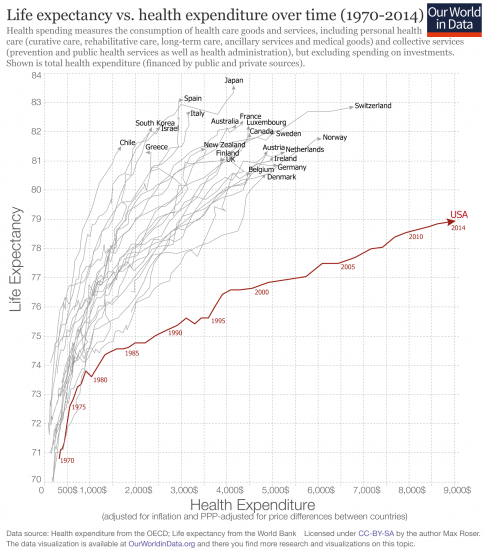- Joined
- Dec 13, 2015
- Messages
- 9,594
- Reaction score
- 2,072
- Location
- France
- Gender
- Male
- Political Leaning
- Centrist
From here: Health Care Costs - An arm and a leg, excerpt:
Can one of the richest countries on earth not afford "Affordable HealthCare". That is, one provided by a National Health System (NHS)?
Most developed countries have an NHS - all of Europe has one and even Canada! The US has only private-insurance healthcare.
THE SAD FACTS
Unless of course, you don't care about living longer? Or the fact that US health-care is a colossal rip-off, twice the individual cost of most other developed countries? See here:

Even as the number of people without insurance has fallen, the proportion of Americans who struggle to pay for treatment has hardly budged. In February of this year, 29% of people said they or a family member had struggled to pay a medical bill, according to a poll by the Kaiser Family Foundation; in March 2010, 30% said the same thing. About 60% of the strugglers in the latest poll had used up most or all of their savings; nearly three-quarters had cut back spending on food, clothes and basic household items.
Strikingly, 30% of people with health insurance reported struggling—not much lower than the 41% without insurance who did so (retired people, who are covered by a government scheme, fared better: only 20% said they struggled).
One reason is that insurers have been passing on more medical charges to patients. A typical insurance plan has a long list of things for which patients must pay a share. In high-deductible plans, which are increasingly popular, families must pay at least $2,600 before any insurance kicks in. Last year a quarter of employers, through whom most Americans get health insurance, offered only high-deductible plans. Some two-fifths plan to do so in the next three years.
Insurance can be alarmingly patchy. A surgeon who stitches up a patient rushed to the emergency room may not be covered by the patient’s health insurance, even when the procedure takes place at a hospital where a stay would be covered. A survey in 2015 found that a third of Americans with private insurance had received such surprise bills, often from an anaesthetist or another doctor.
Patients often do not help themselves even when they can. Only half of Americans have tried to find out what they would be charged before seeking care, according to a recent survey by Public Agenda, a think-tank. Most people think, wrongly, that all doctors and hospitals charge about the same.
In the public’s defence, health plans are opaque and complicated. Many people do not know what type of plan they have because so many have cryptic names, says Larry Levitt at the Kaiser Family Foundation. Working out costs in advance is so tricky that the University of New Hampshire has started offering education on health-care literacy. David Schleifer, who led the Public Agenda survey, says the task can be mind-boggling. To find out the cost of a hernia operation, he had to peruse the list on the insurer’s website, call the hospital to ask about the specific billing codes for the procedure and then call the insurer to check the patient’s payment for those codes. Those who lack his nous must hope that their health holds.
Can one of the richest countries on earth not afford "Affordable HealthCare". That is, one provided by a National Health System (NHS)?
Most developed countries have an NHS - all of Europe has one and even Canada! The US has only private-insurance healthcare.
THE SAD FACTS
Unless of course, you don't care about living longer? Or the fact that US health-care is a colossal rip-off, twice the individual cost of most other developed countries? See here:

